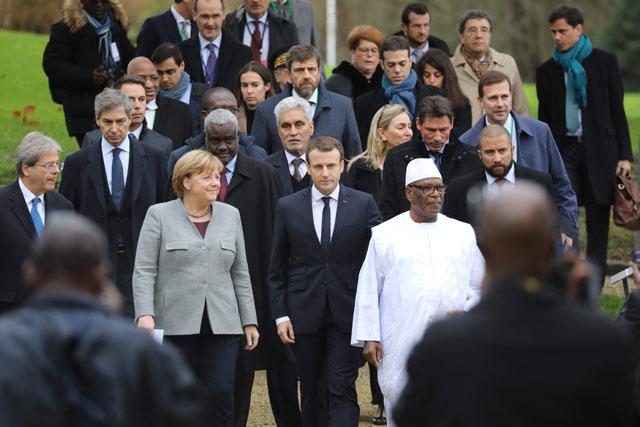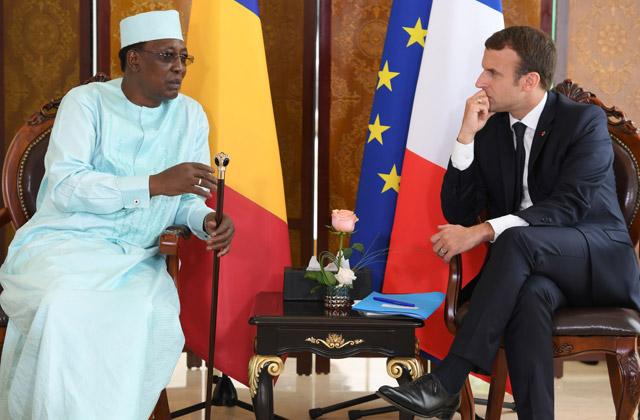You are here
Africa, Europe hope to rally support for Sahel anti-terror force
By AFP - Dec 13,2017 - Last updated at Dec 13,2017

From left: German Chancellor Angela Merkel, France's President Emmanuel Macron and Mali's President Ibrahim Boubacar Keita arrive for a press conference during a conference to support the fight against terrorists in the African Sahel region at the Chateau of the La Celle Saint-Cloud, west of Paris, on Wednesday (AFP photo)
PARIS — French President Emmanuel Macron hosts Germany's Angela Merkel and five African presidents on Wednesday, hoping to bolster the fledging G-5 Sahel force fighting extremists in an area the size of Europe.
Two years in the planning, the force brings together troops from Burkina Faso, Chad, Mali, Mauritania and Niger in a desert region plagued by extremism where France is currently leading counterterrorism operations.
The five countries in the G-5 Sahel force are among the poorest in the world, and funding will be high on the agenda at the talks in Celle-Saint-Cloud outside Paris.
Officials from oil-rich Saudi Arabia — which may confirm a $100 million (85 million euro) contribution, according to the French presidency — are notably on the guestlist, along with representatives of the United Arab Emirates.
Italian Prime Minister Paolo Gentiloni will also attend, as well as officials from the European Union, African Union and United States.
The ambitious goal is to have 5,000 troops operational by mid-2018, wrestling back border areas from extremists — including a local Al Qaeda affiliate — who often enjoy tacit local support in the near-absence of state structures.
Priority number one is to reestablish law and order in the stretch of desert where the borders of Burkina Faso, Mali and Niger converge.
Several hundred troops, backed by France's regional 4,000-strong Barkhane force, took part in the force's first mission in the border zone last month.
But speeding up deployment is crucial, a French presidential source said, with Macron having expressed frustration at delays.
"The terrorists have scored a number of significant military victories, notably in Niger," a Macron aide said when the president visited west Africa late last month.
Militants have mounted repeated attacks in recent months, including an assault in Niger on October 4 which killed four US soldiers, another two weeks later in which 21 Niger troops died and an attack at restaurant in Burkina Faso in August, in which 19 people were killed.
Strategic region
The G-5 force is set to work alongside Barkhane troops and the UN's 12,000-strong MINUSMA peacekeeping operation in Mali — the most dangerous in the world, having lost 90 lives since 2013.
The International Crisis Group described the G-5 force as being part of European efforts to "bring down the expense of their overseas operations by delegating them partially to their African partners".
"The Sahel is politically and economically strategic, especially for France and Germany, both of which view the region as posing a potential threat to their own security and as a source of migration and terrorism," it added in a report.
Wednesday's talks are the latest effort by Macron to forge an influential role on the world stage, a day after he hosted an international climate summit.
They are designed to lay the groundwork for a summit in February focused on raising funds for the G-5 Sahel force which will likely take place in Brussels.
The European Union has so far pledged 50 million euros ($59 million) for the force and France another eight million, while each of the African countries is putting forward 10 million euros.
The United States, another key donor which is sending representatives to Wednesday's talks, has meanwhile promised each of the Sahel countries bilateral aid of $60 million.
But this leaves a serious shortfall, with France hoping to raise at least 250 million euros in the short-term, rising eventually to 400 million euros.
The arid Sahel region has become a magnet for extremist militants since Libya descended into chaos in 2011.
In 2012, Al Qaeda-affiliated extremists overran the north of neighbouring Mali, including the fabled desert city of Timbuktu.
France intervened in 2013 to drive the extremists back but swathes of central and northern Mali remain wracked by violence, which has spilled over into the region.
Related Articles
BAMAKO — French President Emmanuel Macron on Sunday threw his weight behind a planned Sahel force to fight extremists on a lightning visit t
PAU, France — French President Emmanuel Macron is hosting on Monday counterparts from five Sahel countries to reassess their joint fight aga
NOUAKCHOTT — A summit of Sahel countries heard appeals on Tuesday to step up the fight against militants whose offensive across three countr













